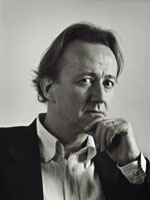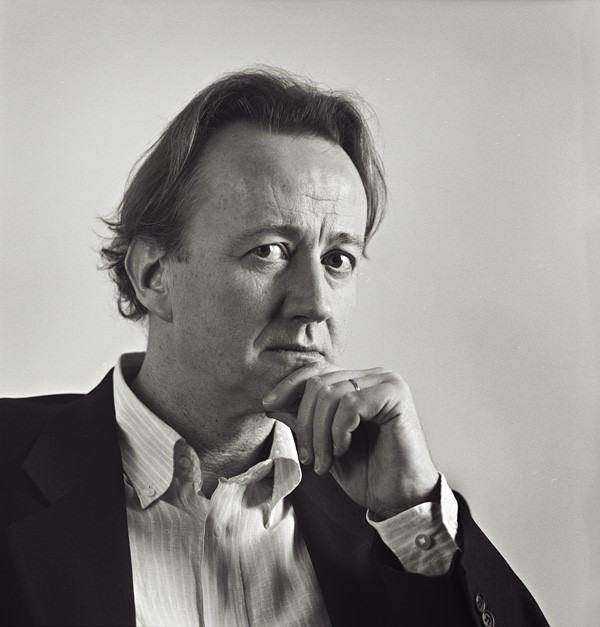
Historian, professor, and author of several works concerning modern Irish history and culture, Roy Foster discusses his experiences exploring the life of Ireland’s William Butler Yeats. As the author of the two-part authorized Yeats biography, W.B. Yeats: A Life, Foster has met with high praise for his work researching the story of this literary legend set against the backdrop of the Irish Revolution of the early twentieth century. Foster previously accessed the Ransom Center’s Yeats archive in the late 1980s, as well as the collections of Yeats’s contemporaries to assist in his research of the poet’s life.
He will be returning to the Ransom Center on Thursday, October 22 at 7:00 p.m to discuss his latest publication, Hearts with One Purpose Alone: W.B. Yeats and the Irish Revolution. The lecture will be followed by a reception sponsored by the Consulate General of Ireland in Austin. The program is free and open to the public, but donations are welcome. Seating is first-come, first-served, and doors open at 6:30 p.m.
In anticipation of Foster’s visit, Cultural Compass reached out to him about his work and research.

As Ireland is home to such a rich tradition of compelling and memorable literary figures, which aspects of Yeats’s life or works attracted you to his story in particular?
I was brought up with Yeats, in a sense, from having his poems read to me as a child (my mother was an English teacher and passionately devoted to Yeats). Later as a history student I became interested in the way that Irish historians who were also close readers of literature, such as Conor Cruise O’Brien and F.S.L. Lyons, used Yeats’s poems to illuminate Irish history, culture and above all politics. Then in 1986 I was asked to take on the authorized biography of Yeats, and it seemed an extraordinary and completely fulfilling subject (on which I spent 18 years).
The contrast with Joyce’s approach and work also struck me—Joyce being determined to “fly by the nets” of Irish politics and religion, and declaring (through Stephen Dedalus) that history is a nightmare from which one tries to awake. I’ve since written an essay about Yeats’s and Joyce’s contrasting relations to Ireland, finding that perhaps there is more in common there than one might think.
How does your background as a historian inform your approach to researching a literary figure?
With Yeats it helped, I think, that I was able to fully contextualize him in his times, and to see his life developing day to day, against a pattern of contingency, and the unforeseen, rather than viewing it as a matter of selected themes- which is how Yeats himself wanted his life to be seen (and left such a template in his autobiographies, which are wonderful but misleading texts). I think as a historian I was also able to approach Yeats’s belief in the occult, and magic, more contextually than some critics: it was part of the intellectual air of the 1880s and 1890s, when he really formed himself. But “historians” don’t exist in an entirely separate compartment from “literary critics”: I’ve always read poetry and indeed fiction, and have used literature in my teaching extensively, where Victorian Britain is concerned for instance, as well as Ireland.
As both a literary and political figure living in a time of political volatility, how did Yeats incorporate the surrounding political environment into his literary work?
Well, Yeats formed a very distinct and distinctive idea of a philosophy of history which involved cycles and repetitions of time, so that the way present politics inform his work (especially during the Irish revolution and civil war) give rise to echoes and repetitions from classical and world history—in a poem such as “Parnell’s Funeral” or “Nineteen Hundred and Nineteen” for example. So it’s not just a question of reflecting historical events, though he does this too, as in his great interrogation of the Easter Rising of 1916, “Easter 1916”: it’s also a question of a world view that swoops through the ages like a hawk (a favorite image of his own) but also zeroes in on actual lived experience. The immediacy and exactness of poems such as “Meditations in Time of Civil War” nail the concrete experience of a country fracturing itself all around him. He’s unlike many political poets in maintaining this double vision.
Your 2014 book, Vivid Faces, focuses on the lives and experiences of Irish revolutionaries prior to and during the Irish Civil War. Was there any aspect of the Irish revolutionary spirit or personality that you found surprising or of particular interest?
The thesis of the book is that the agenda and “slate” of projects visualized by the revolutionary generation was wider, more polyvalent, more secular, more radical than the simpler “faith-and-fatherland” ethos of traditional nationalism which tended to reassert itself after the fighting began. The revolutionary mind-set, indeed the revolutionary zeitgeist, involved themes of anti-clericalism, socialism, feminism, vegetarianism, anti-vivisectionism, fee love and sexual dissidence—themes which I prospected through the private writings of revolutionaries (obscure as well as prominent), especially women. It was an attempt to get behind hindsight. The more I read and listened to their voices the more they seemed like figures from the 1960s (and indeed, the 1890-1914 period in Britain and Ireland, as in the USA, did epitomize many kinds of radicalism which were—so to speak—suppressed by the subsequent period of war and revolution). The book ended up by being as much about revolutionary disillusionment as revolutionary motivation, which surprised me.
Could you share a little about your experience working with the Ransom Center’s Yeats collection? What about the Ransom Center’s collection distinguished itself from others with which you have come in contact?
I have warm memories of my weeks in the Ransom Center, especially the kindness and help extended by Tom Staley, then the director, and Cathy Henderson. I was struck by the sophistication of the cataloging system (this was back in the late 1980s, remember) and the speed with which things arrived at one’s desk; also the imaginative approach taken to archiving different kinds of sources. For instance, I was fascinated by the transcripts and recordings of a radio feature on Yeats made by W.R. Rodgers soon after his death: Rodgers had interviewed a wide range of Yeats’s friends and acquaintances, and of course only used a small proportion of the material he gathered; but his notes and transcripts were preserved in the Ransom Center, covering a far wider range of ideas, and I found them immensely suggestive. Also the collections relevant to people who were associated tangentially with Yeats, such as Ottoline Morrell or Katharine Tynan, were very absorbing and set up fascinating connections. This was all in addition to the Yeats material itself—dramatic as well as poetical, and drafts of work in progress- which was very enlightening. It was all a very long time ago, and I’ve written a good deal since then, so the memory is slightly blurred, but this is what I remember. It was a treasure-house, and a wonderful place to work.